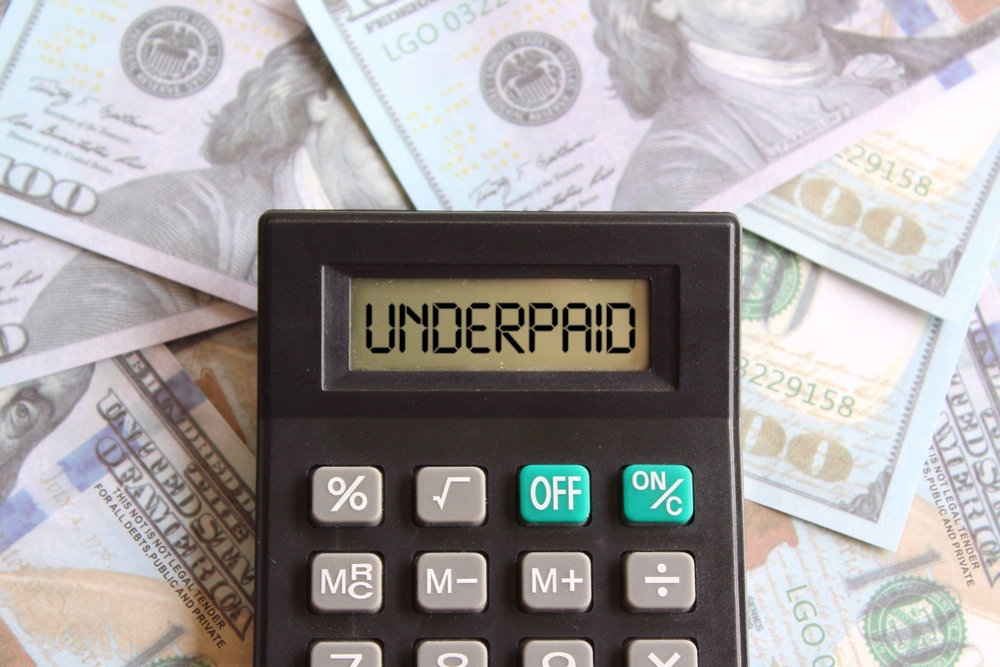
The experience of earning less than your worth creates both negative emotions and decreased motivation. Many employees wonder if they’re being paid fairly, but it’s not always obvious when you’re severely underpaid at your job. Your understanding of warning indicators helps you initiate protective actions while supporting yourself and making informed decisions about your career development. Your workplace motivation, financial stability, and career contentment suffer from underpayment detection because it directly affects your salary. You should begin your search for evidence when you suspect someone is not paying you enough.
1. Your Salary Is Below Market Rate
The most direct sign you’re severely underpaid at your job is earning less than the typical salary for your role and experience. Salaries vary by industry, region, and company size, but there are reliable ways to check what’s standard. Use online resources like Glassdoor’s salary search tool or the Bureau of Labor Statistics to benchmark your pay. If you find your compensation is significantly lower than the median for your field, that’s a red flag.
To prove it, gather data from at least three sources. Document the job titles, locations, and salary ranges you find. Presenting this information to your manager shows you’ve done your homework and aren’t just guessing.
2. You Haven’t Received a Raise in Years
Cost of living and market rates tend to rise over time. If your salary has stayed flat for several years, you’re likely falling behind. Even small annual raises help keep your pay competitive. When you don’t receive any raise—or only minimal increases that don’t match inflation—it’s a strong sign you’re severely underpaid at your job.
Keep records of your pay history. Compare your current salary to what you earned two or three years ago. If your responsibilities have grown but your paycheck hasn’t, that’s further evidence you’re undervalued.
3. New Hires Earn More Than You
If your company brings in new employees at higher salaries for the same or similar roles, it’s a clear indication of pay disparity. Sometimes, companies offer more to attract talent in a competitive market, but this leaves loyal employees underpaid.
How can you prove this? Pay attention to job postings from your company or talk to new colleagues (where appropriate). Document advertised salaries or any salary information you confirm. This gives you leverage when negotiating for fair compensation.
4. Your Responsibilities Have Grown, But Your Pay Hasn’t
Taking on more duties, managing projects, or filling in for others without a corresponding raise is another sign you’re severely underpaid at your job. Job creep is common, but your compensation should reflect your expanded role.
Keep a list of additional tasks, projects, or leadership roles you’ve assumed since your last pay review. When you ask for a raise, bring this list to show how your job has evolved beyond your original description.
5. You Rarely Receive Performance-Based Bonuses
Bonuses and incentives are common ways employers reward strong performance. If you consistently exceed expectations but never see this reflected in your paycheck, you may be underpaid. This is especially true in industries where bonuses are standard.
Document your achievements and compare your bonus history to others in similar roles. If possible, gather data on typical bonus structures in your industry to provide further evidence.
6. Your Benefits Package Is Bare Bones
Compensation isn’t just about salary. A severely underpaid job often comes with minimal benefits: limited health coverage, no retirement matching, or few paid days off. If your total compensation package is weak, you’re likely being shortchanged.
Research what’s standard in your field for benefits. Sites like PayScale’s compensation trends can help. List out your benefits and compare them to the norm—this paints a clearer picture of your overall underpayment.
7. You Feel Financial Stress Despite Full-Time Work
Struggling to pay bills or save money, even though you work full-time, is a practical sign you’re severely underpaid at your job. While personal budgeting is important, chronic financial stress often points to inadequate earnings.
To prove it, track your income versus expenses for several months. If your salary doesn’t cover basic living costs for your area, that’s strong evidence you need a raise or a new job.
How to Build Your Case for a Raise If You’re Severely Underpaid
If you recognize several of these signs, it’s time to act. Record all your research data by writing down salary ranges, job duties, and any noted salary variations. Organize your evidence clearly and professionally. When you meet with your manager, present your case calmly and factually. You should request a specific salary increase that you can justify through your research findings and professional achievements.
Your financial stability requires you to handle the situation of receiving insufficient pay at work, even though it creates discomfort. You should look for different job openings when your current employer refuses to give you a raise because your skills match the requirements of those positions.
Have you ever realized you were severely underpaid at your job? How did you handle it? Share your experience in the comments below.
What to Read Next…
- 7 Signs You Are Being Undervalued at Work and What to Do About It
- How Many of These 10 Common Habits Are Costing You Respect at Work
- Are These 6 Helpful Budget Tips Actually Ruining Your Finances
- 10 Money Mistakes People Make After Losing a Spouse
- 5 Financial Habits That Make You Look Struggling Even When You’re Not
The post 7 Signs You Are Severely Underpaid at Your Job and How to Prove It appeared first on The Free Financial Advisor.







